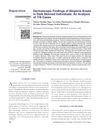 8 citations,
October 1988 in “Clinics in Dermatology”
8 citations,
October 1988 in “Clinics in Dermatology” Current research explores hair growth drugs, while future research aims for personalized treatments.
 151 citations,
May 2021 in “Frontiers in Medicine”
151 citations,
May 2021 in “Frontiers in Medicine” Many patients experience long-lasting symptoms like fatigue and pain after COVID-19, regardless of initial disease severity.
 June 2024 in “Nature Cell and Science”
June 2024 in “Nature Cell and Science” The Scalp Coverage Scoring method reliably measures hair density from images.
 36 citations,
June 2019 in “eLife”
36 citations,
June 2019 in “eLife” The study developed a tool to predict how gut microbes process foods and drugs, showing that similar compounds often share metabolic pathways and effects.
 October 2023 in “The Cochrane library”
October 2023 in “The Cochrane library” The medicine baricitinib was found to notably improve hair regrowth in alopecia areata, but more research is needed on its side effects and other treatments.
 25 citations,
July 2013 in “Actas Dermo-Sifiliográficas”
25 citations,
July 2013 in “Actas Dermo-Sifiliográficas” Acitretin is effective for severe psoriasis and can be used long-term due to no immunosuppression, but must be carefully monitored for side effects and is not for pregnant women.
 September 2003 in “Clinics in Family Practice”
September 2003 in “Clinics in Family Practice” Different hair diseases affect people during childbearing years, with treatments ranging from medication to psychological support.
 1 citations,
January 2022 in “Open Access Macedonian Journal of Medical Sciences”
1 citations,
January 2022 in “Open Access Macedonian Journal of Medical Sciences” Both platelet-rich plasma and low-level laser therapy effectively treat hair loss with minimal side effects and good cost-benefit ratio.
March 2024 in “Nutrients” Alopecia Areata is linked to specific gut bacteria and metabolites, indicating a complex gut microbiome.
37 citations,
February 2010 in “Psychoneuroendocrinology” Androgen self-administration might be controlled by membrane receptors, not nuclear ones.
 99 citations,
July 2017 in “Clinical Reviews in Allergy & Immunology”
99 citations,
July 2017 in “Clinical Reviews in Allergy & Immunology” New treatments for Alopecia Areata show promise but need to be more effective and affordable.
 19 citations,
January 2016 in “Biological & Pharmaceutical Bulletin”
19 citations,
January 2016 in “Biological & Pharmaceutical Bulletin” Sargassum muticum extract and its component apo-9'-fucoxanthinone may help hair growth and treat hair loss.
2 citations,
October 2021 in “JID innovations” Uterine leiomyomas don't significantly change gene expression in the scalp of people with Central Centrifugal Cicatricial Alopecia.
 31 citations,
June 2018 in “Dermatologic Surgery”
31 citations,
June 2018 in “Dermatologic Surgery” Low-level light therapy safely improves hair coverage, thickness, and count in androgenetic alopecia patients.
 136 citations,
February 2017 in “International Journal of Molecular Sciences”
136 citations,
February 2017 in “International Journal of Molecular Sciences” PRP treatment improves hair growth, and the device used can affect results, with some being more effective.
 21 citations,
January 2014 in “International Journal of Trichology”
21 citations,
January 2014 in “International Journal of Trichology” The study concluded that yellow dots are a common and useful sign for diagnosing alopecia areata in dark-skinned individuals and may indicate the severity of the condition.
 5 citations,
March 2020 in “Current Opinion in Endocrine and Metabolic Research”
5 citations,
March 2020 in “Current Opinion in Endocrine and Metabolic Research” Skin problems in PCOS, like excess hair, acne, and hair loss, may not always indicate high male hormone levels and need careful diagnosis for proper treatment.
 17 citations,
October 2015 in “Medicine and Pharmacy Reports”
17 citations,
October 2015 in “Medicine and Pharmacy Reports” Animal models are crucial for learning about hair loss and finding treatments.

Modern skin cancer treatments can cause skin side effects and hair loss, affecting patients' quality of life.
 June 2024 in “Archives of dermatological research”
June 2024 in “Archives of dermatological research” Both treatments work, but Minoxidil 0.5% MMP® is better for certain scalp areas and less advanced hair loss.
 1 citations,
May 2024 in “Dermatology and Therapy”
1 citations,
May 2024 in “Dermatology and Therapy” Frontal Fibrosing Alopecia needs better diagnostics and treatments, with dutasteride showing promise.
 10 citations,
January 2009 in “Elsevier eBooks”
10 citations,
January 2009 in “Elsevier eBooks” Hair growth is influenced by hormones and goes through different phases; androgens can both promote and inhibit hair growth depending on the body area.
 78 citations,
February 2004 in “British Journal of Dermatology”
78 citations,
February 2004 in “British Journal of Dermatology” Melatonin helps hair growth in women with hair loss.
 47 citations,
August 2011 in “Journal of The European Academy of Dermatology and Venereology”
47 citations,
August 2011 in “Journal of The European Academy of Dermatology and Venereology” Laser treatment increases hair density and thickness safely in women with hair loss.
 51 citations,
January 2004 in “Skin Pharmacology and Physiology”
51 citations,
January 2004 in “Skin Pharmacology and Physiology” The document explains hair growth and shedding, factors affecting it, and methods to evaluate hair loss, emphasizing the importance of skin biopsy for diagnosis.
 26 citations,
January 2013 in “BMJ Open”
26 citations,
January 2013 in “BMJ Open” Severe baldness on the top of the head is linked to a higher chance of heart disease, especially in men under 60.
 39 citations,
January 2012 in “International Journal of Trichology”
39 citations,
January 2012 in “International Journal of Trichology” Melatonin solution helps treat hair loss in men and women.
 January 2013 in “Springer eBooks”
January 2013 in “Springer eBooks” Hair care products are important for appearance and self-esteem, and choosing the right ones can help maintain healthy hair.
 April 2024 in “Frontiers in pharmacology”
April 2024 in “Frontiers in pharmacology” Brepocitinib 30mg is most effective for moderate-to-severe alopecia areata, but ritlecitinib 50mg may offer a better balance of safety and effectiveness.
 3 citations,
January 2019 in “International Journal of Trichology”
3 citations,
January 2019 in “International Journal of Trichology” The article concludes that treating hair loss requires careful research, understanding the causes, and personalized treatment plans.



























